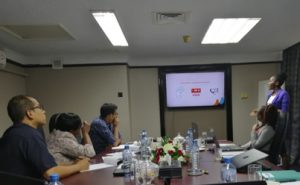 Agriculture contributes about 25% of the Gross Domestic Product (GDP) and engages 70% of the labour force in rural areas of Kenya. The sector is dominated by small to medium farmers who rely on seasonal rainfall, which makes them vulnerable to negative impacts of climate change. As a result of extreme weather events such as droughts and floods, Kenya lost up to £5.4 billion in livestock and another £1 billion in crops between 2008 and 2017. Direct interventions and international aid used to alleviate the impacts of extreme weather events can be inefficient and disrupt government plans. Therefore, development of adaptation strategies to help farmers and pastoralists cope with weather related risks is required. One approach currently being trailed is the use of index-based insurance schemes (i.e. for both livestock and crops) to buffer farmers against weather related losses. The implementation of these index based insurance schemes require reliable and temporally continuous sources of data, which can be provided by Earth Observation satellites.
Agriculture contributes about 25% of the Gross Domestic Product (GDP) and engages 70% of the labour force in rural areas of Kenya. The sector is dominated by small to medium farmers who rely on seasonal rainfall, which makes them vulnerable to negative impacts of climate change. As a result of extreme weather events such as droughts and floods, Kenya lost up to £5.4 billion in livestock and another £1 billion in crops between 2008 and 2017. Direct interventions and international aid used to alleviate the impacts of extreme weather events can be inefficient and disrupt government plans. Therefore, development of adaptation strategies to help farmers and pastoralists cope with weather related risks is required. One approach currently being trailed is the use of index-based insurance schemes (i.e. for both livestock and crops) to buffer farmers against weather related losses. The implementation of these index based insurance schemes require reliable and temporally continuous sources of data, which can be provided by Earth Observation satellites.

In April 2019, Professor Jadu Dash, Dr Julio Pastor and Dr Booker Ogutu from the Earth Observation of the Biosphere At Southampton (EOBAS) group met scientists from International Livestock Research Institute (ILRI) in Nairobi, Kenya (Figure 1) to discuss the possibility of using satellite data products developed at EOBAS to support the Kenya Livestock Insurance Programme (KLIP). As a result of this meeting, the EOBAS group is currently testing and developing protocols for using datasets from the European Space Agency (ESA) Copernicus Program into the KLIP program.
Finally, in August 2019 Professor Jadu Dash, Dr Julio Pastor and Dr Booker Ogutu ran a workshop with crop insurance stakeholders in Kenya to understand the needs of the Kenya Agriculture Insurance Programme (KAIP) and how Earth Observation products developed by EOBAS can be used to enhance the scheme. The workshop was attended by representatives from the Ministry of Agriculture, researchers from the University of Embu and people from NGO and communications sector (Figure 2). Key areas where the University of Southampton EOBAS group can contribute to enhance the crop insurance scheme were identified, including designing a protocol to derive agro-ecological zones from EO data and developing an EO data based variable for crop yield estimation and verification. It is envisaged that the findings/gaps identified from this workshop will be developed into a future research proposal.



